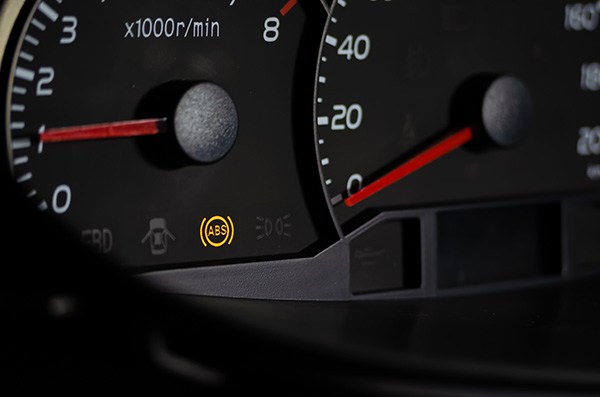
Seeing a dashboard light come on is never a welcome surprise, and the ABS warning is one of those signals that deserves your attention. While it doesn’t necessarily mean your brakes are failing, it does point to a problem within your vehicle’s Anti-lock Braking System (ABS). Understanding what the ABS light means, what can trigger it, and how to respond helps you stay safer and avoid more expensive repairs.
Let’s take a closer look at what causes the ABS light to come on and what you should do about it.
How The ABS Works
Your ABS is a safety system designed to keep your wheels from locking up during hard or sudden braking. It uses sensors on each wheel to monitor speed, and when it detects rapid deceleration or potential lock-up, it adjusts brake pressure in milliseconds to help you maintain steering control.
It’s especially important in wet, icy, or slippery conditions. When the ABS is working correctly, you’ll feel a pulsing sensation in the brake pedal during emergency braking—this is normal and part of the system doing its job.
Why Your ABS Light Might Be On
When the ABS warning light appears on your dashboard, it means the system has detected an issue and disabled the anti-lock feature.
Common causes include:
- Malfunctioning wheel speed sensor: These sensors gather critical data for the ABS. If one fails, the system can’t function properly.
- Worn or damaged tone ring: This part works with the sensor to monitor wheel movement. Cracks or corrosion can trigger warning lights.
- Low brake fluid: The ABS relies on proper fluid pressure to modulate braking. If your fluid is low, it can disable the system.
- Blown fuse or faulty ABS module: Electrical problems can prevent the system from communicating with the vehicle’s computer.
- Damaged wiring: Frayed wires or corroded connectors can interrupt signals and trigger warning lights.
Is It Safe to Drive With the ABS Light On
In most cases, your standard braking system will still work normally even when the ABS is offline. That means your car will still stop—but without the added benefit of anti-lock functionality in slippery or emergency conditions.
If the ABS light is on by itself, it’s typically not an emergency, but it should still be checked soon. However, if it appears along with the brake warning light or if you notice reduced braking performance, it could indicate a more serious issue. In those situations, avoid driving until your brakes are inspected.
What to Do When the Light Appears
Start by checking your brake fluid level. If it’s low, topping it off may temporarily resolve the issue, though you’ll still want to know why the level dropped in the first place.
If the light remains on, the next step is to schedule a diagnostic scan. Technicians can retrieve error codes stored in your vehicle’s computer and pinpoint the exact cause of the alert. This allows for faster and more accurate repairs.
Driving around with the light on for too long can lead to greater wear on your braking system or leave you unprepared in poor weather conditions.
How to Prevent ABS Problems
Keeping your ABS in good shape starts with basic brake maintenance. Have your fluid levels checked regularly and your brake pads, rotors, and calipers inspected for wear.
Washing your vehicle, especially the undercarriage, can also help prevent sensor damage caused by road salt and grime. During winter months, buildup around your wheels and brakes can interfere with ABS components.
Routine inspections at service intervals provide technicians with an opportunity to identify early signs of trouble, such as sensor wear or minor leaks, before they become more severe.
How ABS Ties Into Other Safety Features
Many modern vehicles use the ABS as part of a larger network of safety systems. It often works in tandem with traction control and electronic stability control. When the ABS isn’t working, those systems may also be affected or disabled.
This makes addressing the ABS light even more important, especially in vehicles with advanced driver assistance features. A problem with one sensor can ripple into other systems and reduce your vehicle’s ability to react in dangerous situations.
Visit Future Auto Service in Burbank, CA
At Future Auto Service in Burbank, CA, we understand how vital your ABS is to your overall safety. Our skilled technicians utilize advanced diagnostics to pinpoint the exact cause of ABS warning lights and perform the necessary repairs to restore full braking performance.
If your ABS light is on or you’re unsure about any brake-related issue, visit us for a full inspection. We'll help keep your vehicle safe and responsive—so you can drive with confidence in any road condition.